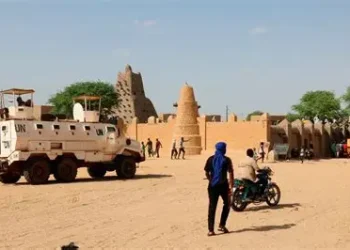Following the Kuki Chief Association’s lead, multiple Kuki-Zo organizations in Manipur have united against the Indo-Myanmar border fence. Their concerns about disrupted livelihoods and a “misleading narrative” linking them to illegal immigration are echoed by Naga tribes and Zoros in Mizoram, who fear division and cultural fragmentation.
BY PC Bureau
April 15, 2025: A growing chorus of opposition is emerging against the Modi government’s plan to construct border fencing along the Indo-Myanmar border, with various tribal organizations in Manipur and neighboring states voicing strong dissent.
Following the lead of the Kuki Chief Association, multiple Kuki-Zo civil society organizations (CSOs) based in Moreh and its surrounding areas in Tengnoupal district have vehemently protested the move, citing threats to their traditional way of life, social fabric, and cultural heritage.
In a joint statement released on Monday, prominent Kuki-Zo CSOs including the Kuki Chief Association Moreh Block, Hill Tribal Council Moreh, Kuki Students’ Organisation Moreh Block, Moreh Youth Club, Kuki Khanglai Lampi, and Kuki Women Union and Human Rights Moreh Block, declared their solidarity with the Kuki Chief Association’s firm stance against the border fencing. They argued that the imposition of such barriers by the government would severely disrupt the social cohesion, cultural practices, and livelihoods of the Kuki-Zo communities, whose traditional way of life often transcends the international border.
Furthermore, the CSOs strongly refuted the narrative propagated by some in the Meitei community that attributes the ongoing ethnic clashes to illegal immigration from Myanmar. They labeled this a “blatant and misleading narrative” aimed at discrediting the Kuki-Zo people and urged the government to adopt a more balanced and sensitive approach to the complex issues at hand.
ALSO READ: Hopes Dashed: Meitei Pilgrims Turn Back Amid Protests
Their opposition echoes the earlier stance of the Kuki Chiefs Association Manipur (KCA-M), which on April 12 reaffirmed its unwavering resistance  to the border fencing project. The KCA-M asserted that the proposed fencing represents a “direct affront to the rights and interests of the indigenous tribes” settled in the border region. They warned that such barriers would lead to the “disintegration of their social fabric and traditions,” emphasizing the paramount importance of maintaining their cultural identity and unity. The KCA-M has called upon all Kuki chiefs and community members to deny permission for their lands to be used for this “divisive” project.
to the border fencing project. The KCA-M asserted that the proposed fencing represents a “direct affront to the rights and interests of the indigenous tribes” settled in the border region. They warned that such barriers would lead to the “disintegration of their social fabric and traditions,” emphasizing the paramount importance of maintaining their cultural identity and unity. The KCA-M has called upon all Kuki chiefs and community members to deny permission for their lands to be used for this “divisive” project.
Nagas and Zor
Kuki chiefs strongly stand firm in their resistance on the border fencing efforts which threatens the traditional way of people’s life in the region.The Mayhem in Manipur is a state sponsored spearheaded by Meitei militia,yet go scot free till today @BJP4India @AmitShah pic.twitter.com/NoAjFbf99x
— Jangmin Touthang (@JangminTouthan1) April 14, 2025
os in Mizoram Join the Opposition:
The opposition to the border fencing is not limited to the Kuki-Zo communities in Manipur. Various Naga tribes residing along the border areas have also expressed their strong reservations against the fencing project. These Naga organizations share concerns about the division of their ancestral lands and the disruption of their traditional cross-border interactions and kinship ties.
ALSO READ: Harvard Defies Trump’s Dictate, Faces $2.26 b Funding Cut
Adding to this widespread tribal opposition, civil society groups representing the Zoros in Mizoram have also voiced their dissent. The Zoros, who share ethnic and cultural links with the Kuki-Zo communities in Manipur and across the border in Myanmar, fear that the fencing will impede their traditional movements and further fragment their ethnic brethren. These organizations in Mizoram have echoed the concerns raised in Manipur about the potential negative impact on social cohesion and cultural continuity.
The unified opposition from these diverse tribal communities along the Indo-Myanmar border underscores the deep-seated concerns regarding the potential social, cultural, and economic consequences of the fencing project. They are collectively urging the government to reconsider the plan and engage in meaningful consultations with all affected indigenous populations to find solutions that respect their rights and traditional ways of life.
ALSO READ: COCOMI Warns Kukis as Meitei Fury Erupts Over Failed Thangjing Pilgrimage












